
Decca Records is a British record label established in 1929 by Edward Lewis. Its US label was established in late 1934 by Lewis, Jack Kapp and Milton Rackmil, who later became American Decca's president too. In 1937, anticipating Nazi aggression leading to World War II, Lewis sold American Decca, and the link between the UK and US Decca label was broken for several decades. The British label was renowned for its development of recording methods, while the American company developed the concept of cast albums in the musical genre.
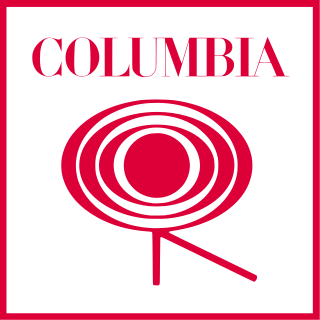
Columbia Records is an American record label owned by Sony Music Entertainment, a subsidiary of Sony Corporation of America, the American division of multinational conglomerate Sony. Columbia is the oldest surviving brand name in the recorded sound business, and the second major company to produce records. From 1961 to 1991, its recordings were released outside North America under the name CBS Records to avoid confusion with EMI's Columbia Graphophone Company. Columbia is one of Sony Music's four flagship record labels: Epic Records, and former longtime rivals, RCA Records and Arista Records as the latter two were originally owned by BMG before its 2008 relaunch after Sony's acquisition alongside other BMG labels.
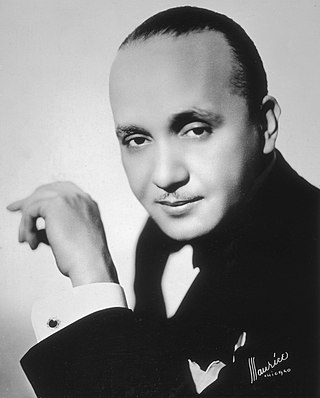
James Fletcher Hamilton Henderson was an American pianist, bandleader, arranger and composer, important in the development of big band jazz and swing music. He was one of the most prolific black musical arrangers and, along with Duke Ellington, is considered one of the most influential arrangers and bandleaders in jazz history. Henderson's influence was vast. He helped bridge the gap between the Dixieland and the swing eras. He was often known as "Smack" Henderson.

Brunswick Records is an American record label founded in 1916.
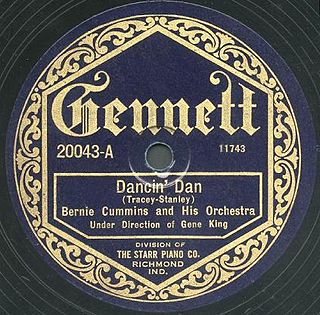
Gennett Records was an American record company and label in Richmond, Indiana, United States, which flourished in the 1920s and produced the Gennett, Starr, Champion, Superior, and Van Speaking labels. The company also produced some Supertone, Silvertone, and Challenge records under contract. The firm also pressed, under contract, records for record labels such as Autograph, Rainbow, Hitch, Our Song, and Vaughn. Gennett produced some of the earliest recordings by Louis Armstrong, King Oliver, Bix Beiderbecke, and Hoagy Carmichael. Its roster also included Jelly Roll Morton, Blind Lemon Jefferson, Charley Patton, and Gene Autry.
Autograph Records was an American record label in the 1920s owned by Marsh Laboratories of Chicago, Illinois, which was owned by Orlando R. Marsh, an electrical engineer.

Paramount Records was an American record label known for its recordings of jazz and blues in the 1920s and early 1930s, including such artists as Ma Rainey, Tommy Johnson and Blind Lemon Jefferson.
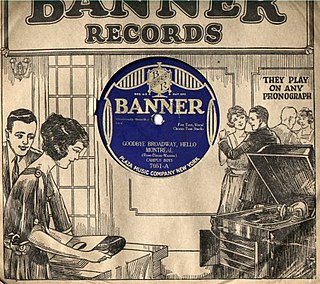
Banner Records was an American record company and label in the 1920s and 1930s. It was created primarily for the S.S. Kresge Company, though it was employed as a budget label in other discount stores.

Radiex Records was an American record label during the 1920s. It was manufactured by Grey Gull Records of Boston, Massachusetts, from 1921 until the demise of Grey Gull in late 1930; it was then pressed for a few more months into 1931 by the successor firm, which continued the Radiex, Van Dyke and Madison labels. Radiex records were sold in Montgomery Ward catalogs although they were not manufactured specifically for that firm. In some cases, records have been found which had the labels of other Grey Gull products over Radiex labels or vice versa.

Puritan Records was an American record label which lasted from 1917 to 1929. For most of its existence Puritan was a product of the Wisconsin Chair Company, which also marketed Paramount Records, but as a label, Puritan briefly predates Paramount and began with United Phonographs Corporation.

Supertone Records was an American record label in the 1920s. Supertone Records were marketed by Sears, Roebuck & Co. in 1924 and again in 1929–1931. Supertone was one of several record disc brand names marketed by Sears. Supertone records were initially made by the Fletcher Record Company in 1924. The discs produced by Fletcher included midwestern dance bands. When Fletcher failed in mid–1924, Bridgeport Die & Machine Company began producing Supertone discs in late 1924.

The Winner Records was a United Kingdom-based record label from 1912 onwards. Its records were manufactured by the Edison Bell Record Works, London. This company, founded by James Hough, had originated in the early 1890s as an importer of Edison and Columbia phonograph cylinders; from 1898 Hough had also made cylinder records, initially using a separate company, Edisonia. When Edison set up his own European operation in 1904, the import franchise was withdrawn, but the name Edison Bell remained in use. From 1909 the official name of Edison-Bell was J. E. Hough Ltd.

American Record Corporation (ARC), also referred to as American Record Company, American Recording Corporation, or ARC Records, was an American record company in operation from 1929 to 1938, and again from 1978 to 1982.

Ben Pollack was an American drummer and bandleader from the mid-1920s through the swing era. His eye for talent led him to employ musicians such as Benny Goodman, Jack Teagarden, Glenn Miller, Jimmy McPartland, and Harry James. This ability earned him the nickname the "Father of Swing".

Vitaphone was a sound film system used for feature films and nearly 1,000 short subjects made by Warner Bros. and its sister studio First National from 1926 to 1931. Vitaphone is the last major analog sound-on-disc system and the only one that was widely used and commercially successful. The soundtrack is not printed on the film, but issued separately on phonograph records. The discs, recorded at 33+1⁄3 rpm and typically 16 inches (41 cm) in diameter, are played on a turntable physically coupled to the projector motor while the film is projected. Its frequency response is 4300 Hz. Many early talkies, such as The Jazz Singer (1927), used the Vitaphone system. The name "Vitaphone" derived from the Latin and Greek words, respectively, for "living" and "sound".

The Dorsey Brothers were an American studio dance band, led by Tommy and Jimmy Dorsey. They started recording in 1928 for OKeh Records.
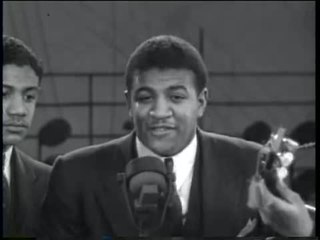
"Dinah" is a popular song published in 1925 and introduced by Ethel Waters at the Plantation Club on Broadway. It was integrated into the show Kid Boots. The music was written by Harry Akst and the lyrics by Sam M. Lewis and Joe Young. Hit versions in 1926 were by Ethel Waters, The Revelers, Cliff Edwards, and Fletcher Henderson.

Crown Records was a record company and dime-store label that existed from 1930 to 1933 in New York City. Its catalogue included music by Eubie Blake and Fletcher Henderson. Known as the label offering "Two Hits for Two Bits" proudly printed on their sleeves, Crown's discs sold for 25 cents.
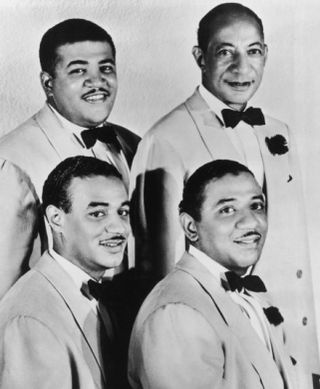
The Mills Brothers, sometimes billed The Four Mills Brothers and originally known as Four Boys and a Guitar, were an American jazz and traditional pop vocal quartet who made more than 2,000 recordings that sold more than 50 million copies and garnered at least three dozen gold records.
Edison Bell was an English company that was the first distributor and an early manufacturer of gramophones and gramophone records. The company survived through several incarnations, becoming a top producer of budget records in England through the early 1930s until, after it was absorbed by Decca in 1932, production of various Edison Bell labels ceased.


















